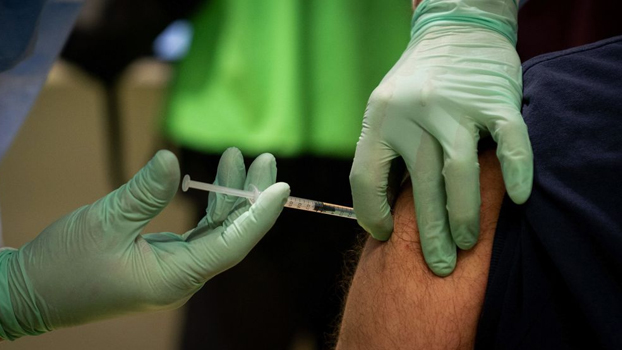The EU is all out of vaccine excuses
While the Brits are opening back up, the French are locking down. It’s time for a whatever-it-takes plan

The European Union has had a dire Covid-19 vaccination campaign so far, and there’s been plenty of buck-passing as a result. Slow regulatory approvals, contractual spats with drugmakers and doubts over vaccine efficacy have all been blamed.
But the bloc is running out of excuses, and its leaders know it. The big issues look fixable, but the pace remains slow. It’s time to step up and get needles in arms, and, importantly, learn from countries that are getting it right. These include EU members like Denmark, and also outsiders like the U.K. — however awkward that may be given ongoing post-Brexit tensions.
The fitful start to vaccine rollouts in countries such as France and Germany might once have been seen as teething problems. No longer. Even with expensive consulting contracts with firms like McKinsey, the elite team of bureaucrats in Emmanuel Macron’s administration have so far administered doses equivalent to just 6.1% of the population, according to data compiled by Bloomberg, compared with Brexit Britain’s 28.3% and Israel’s 86%. Neighboring Germany is at 6.5%, in line with the EU average, while Denmark and Iceland are outperforming, at 8-9%.
The leisurely stride hit by France of around 90,000-100,000 daily jabs in January has stayed leisurely since, even as hesitancy over getting vaccinated is falling away and supply issues are being solved, and there’s an especially worrying drop-off in inoculations on weekends. The Brits, following weeks of grueling lockdown amid a jump in cases that peaked in January, are at a multiple of four times that.
Speeding up production and delivery of vaccines is EU leaders’
“top priority,” EU Council President Charles Michel said Thursday
evening. That’s encouraging. Given the examples in Europe’s own
neighborhood of strategies that work, it’s time to rise to the challenge
U.K. Prime Minister Boris Johnson may no longer have a seat at the EU’s top table, but he’s still managing to cast a long shadow. His prudent and hopeful post-vaccination reopening plan unveiled this week — a step in the right direction after a string of pandemic errors — comes just as the Macron administration is sliding further towards lockdown. While fighting Covid shouldn’t be a race, the U.K.’s strides in battling more contagious variants should drive home to the Europeans that speeding up vaccines means saving lives and reopening sooner.
What’s needed is a whatever-it-takes approach for the EU. Spending shouldn’t matter, because, as Jacob Kirkegaard of the Peterson Institute for International Economics puts it, “the vaccine pays for itself.” A recent Allianz report found that the EU’s current vaccination pace could end up costing its economy close to 90 billion euros ($109 billion) by delaying the lifting of restrictions by five weeks. Given that France and Germany are the EU’s two biggest economies, it matters a lot that they’re vaccinating with underwhelming speed.
Improved availability of doses is one part of the answer. A rigid two-dose EU approach perhaps made sense at the start of the rollout, because there were few approved vaccines and worries of a supply crunch. But it makes less sense now. More Pfizer Inc. and Moderna Inc. doses are on the way, and Johnson & Johnson’s one-shot vaccine may be approved next month. U.K. data suggests a single shot offers high levels of protection. And even if countries don’t adopt the U.K. strategy of spacing out shots by 12 weeks, and stick to the recommended 3 to 4, the improved supply pipeline should put an end to policies that let doses sit in the freezer.
There’s also the role of efficiency and logistics. One reason why Denmark is doing so well is because it’s highly digitalized: A personal identification number, known as CPR, links every resident to a centralized national register that makes it easier to plan vaccinations. There are low-tech solutions, too. More hands on deck, such as by using pharmacy networks in France or the military in Germany, might help. As the age range of those allowed to get inoculated widens, it would help to set up round-the-clock vaccination centers, something the U.K. has planned, while also improving the public messaging, better using platforms like social media.
Finally, improving demand means continually appealing to vaccine doubters. While hesitancy over mRNA technology used by Pfizer and Moderna has melted away, it seems to have lingered for AstraZeneca Plc’s vaccine, which landed in Europe with poor (and inaccurate) media coverage. (Macron, who had himself cast doubt on the vaccine’s efficacy for the elderly, on Thursday said he would take it if offered.) This will likely change with better communication and more data: France’s top vaccine official on Thursday cited encouraging U.K. data on its efficacy, and also suggested a decision to restrict it to under-65s could be changed based on new evidence.
Speeding up production and delivery of vaccines is EU leaders’ “top priority,” EU Council President Charles Michel said Thursday evening. That’s encouraging. Given the examples in Europe’s own neighborhood of strategies that work, it’s time to rise to the challenge.
Lionel Laurent is a Bloomberg Opinion columnist covering the European Union and France.
He worked previously at Reuters and Forbes.
Source: Bloomberg



